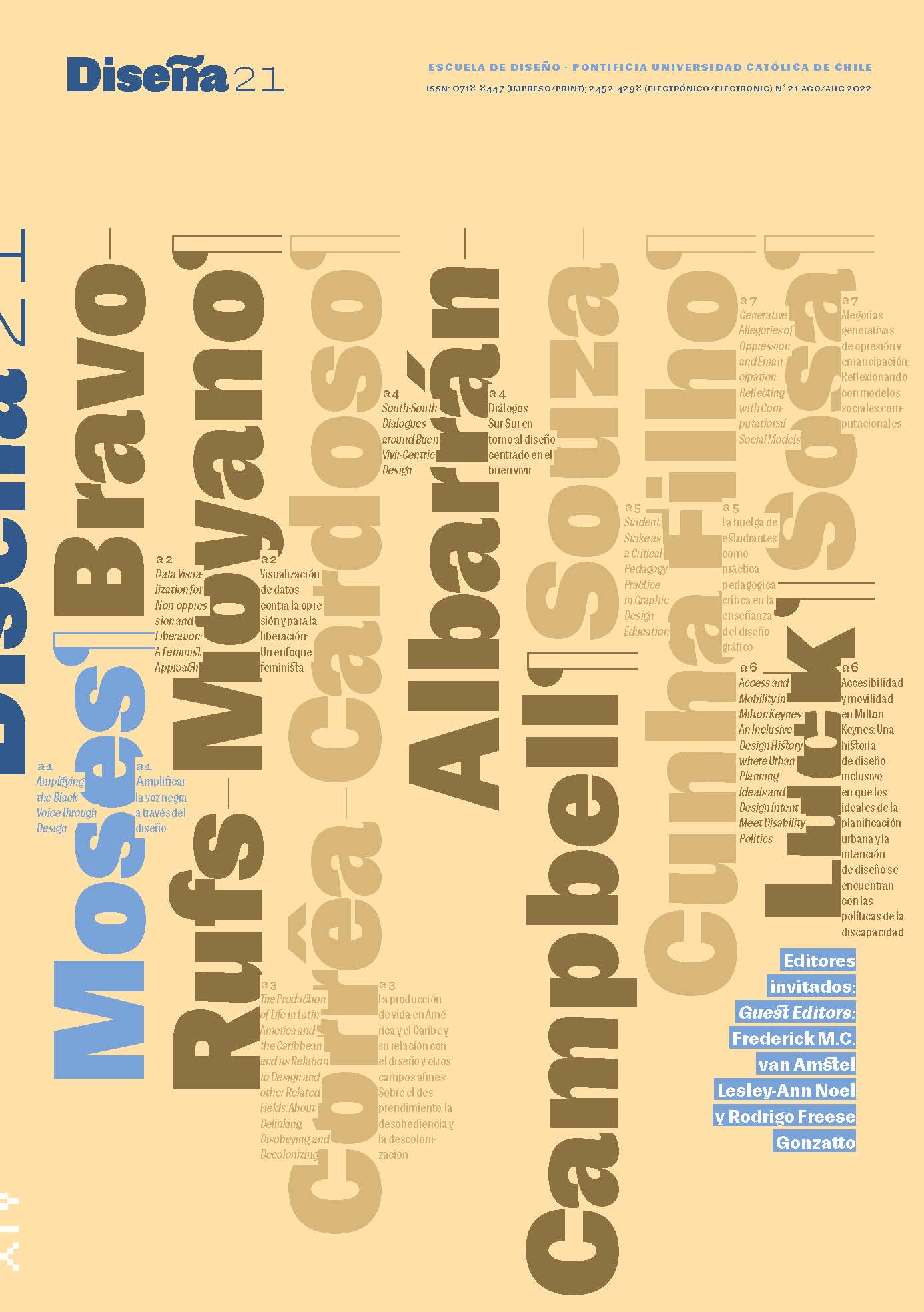Estrategias anti opresivas de evaluación para la enseñanza del diseño
Contenido principal del artículo
Resumen
Esta editorial pretende hacer un aporte a la discusión abierta por los editores de este número visibilizando las dinámicas de poder implícitas en las estrategias de evaluación. Se plantea que, al evaluar a los estudiantes en forma acrítica, no solo reproducimos patrones de estratificación social, sino que también los legitimamos. Se proponen tres estrategias que podrían contribuir a adoptar formas liberadoras de evaluación en el ámbito de la enseñanza del diseño: la autoevaluación, la libertad de formato y la ponderación libre. Más allá de su valor instrumental, se subraya que estas estrategias permiten visibilizar las relaciones de poder, abriendo una vía para subvertirlas.
Descargas
Detalles del artículo

Esta obra está bajo una licencia internacional Creative Commons Atribución-CompartirIgual 4.0.

Este obra está bajo una licencia de Creative Commons Reconocimiento-CompartirIgual 4.0 Internacional.
NOTA DE COPYRIGHT
Todos los contenidos de esta edición electrónica se distribuyen bajo licencia Creative Commons de “Atribución-Copartirigual 4.0 Internacional” (CC-BY-SA). Cualquier reproducción total o parcial del material deberá citar su procedencia.
Los derechos de las imágenes publicadas pertenecen a sus autores, quienes otorgan a Diseña la licencia para su uso. La gestión de los permisos y la autorización de publicación de las imágenes (o de cualquier material) que contenga derechos de autor y sus consecuentes derechos de reproducción en esta publicación es de exclusiva responsabilidad de los autores de los artículos.
Citas
Boud, D. (2000). Sustainable Assessment: Rethinking Assessment for the Learning Society. Studies in Continuing Education, 22(2), 151–167. https://doi.org/10.1080/713695728
Boud, D., Lawson, R., & Thompson, D. G. (2013). Does Student Engagement in Self-assessment Calibrate their Judgement over Time? Assessment & Evaluation in Higher Education, 38(8), 941–956. https://doi.org/10.1080/02602938.2013.769198
Broadfoot, P. (1996). Education, Assessment, and Society: A Sociological Analysis. Open University Press.
Brown, W. (2011). Neoliberalized Knowledge. History of the Present, 1(1), 113–129. https://doi.org/10.5406/historypresent.1.1.0113
Crabtree, S. A., Hemingway, A., Sudbury, S., Quinney, A., Hutchings, M., Esteves, L., Thompson, S., Jacey, H., Diaz, A., Bradley, P., Hall, J., Board, M., Feigenbaum, A., Brown, L., Heaslip, V., & Norton, L. (2020). Donning the ‘Slow Professor’: A Feminist Action Research Project. Radical Teacher, 116, 55–65. https://doi.org/10.5195/rt.2020.647
Cummins, J. (2003). Challenging the Construction of Difference as Deficit: Where are Identity, Intellect, Imagination, and Power in the New Regime of Truth? In P. P. Trifonas (Ed.), Pedagogies of Difference: Rethinking Education for Social Change (pp. 39–57). Routledge.
Filer, A. (2000). Assessement: Social Practice and Social Product. Routledge.
Foucault, M. (1995). Discipline & Punish: The Birth of the Prison (A. Sheridan, Trans.). Vintage Books.
Freire, P. (1997). Pedagogía del oprimido. Siglo Veintiuno Editores.
Godwin, S. E., & Ward‐Edwards, C. (2018). Participatory Assessment: Enlisting Community Partners to Facilitate Boundary Spanning, Reflexive Student Activism, and Institutional Change. In D. E. Lund (Ed.), The Wiley International Handbook of Service-Learning for Social Justice (pp. 415–436). Wiley.
Hanesworth, P., Bracken, S., & Elkington, S. (2019). A Typology for a Social Justice Approach to Assessment: Learning from Universal Design and Culturally Sustaining Pedagogy. Teaching in Higher Education, 24(1), 98–114. https://doi.org/10.1080/13562517.2018.1465405
Illich, I. (1973). Deschooling Society. Harrow.
King, C. J. (2018). Service‐Learning as Power Analysis in the Humanities. In D. E. Lund (Ed.), The Wiley International Handbook of Service-Learning for Social Justice (pp. 437–455). Wiley.
McArthur, J. (2016). Assessment for Social Justice: The Role of Assessment in Achieving Social Justice. Assessment & Evaluation in Higher Education, 41(7), 967–981. https://doi.org/10.1080/02602938.2015.1053429
Quijano, A. (2014). Cuestiones y horizontes: De la dependencia histórico-estructural a la colonialidad/descolonialidad del poder. CLACSO.
Reitenauer, V. (2019). “A Practice of Freedom”: Self-grading for Liberatory Learning. Radical Teacher, 113, 103–105. https://doi.org/10.5195/rt.2019.612
Ruggerone, L., & Stauss, R. (2022). The Deceptive Mirror: The Dressed Body Beyond Reflection. Fashion Theory, 26(2), 211–235. https://doi.org/10.1080/1362704X.2020.1766228
Spademan, T. B. (1999). Radical Pedagogy and the Logic of Assessment. The Radical Teacher, 56, 26–29.
Taylor, A., Glick, S., & Peikazadi, N. (2018). Service‐Learning and the Discourse of Social Justice. In D. E. Lund (Ed.), The Wiley International Handbook of Service-Learning for Social Justice (pp. 29–51). Wiley.
Walker, M., & Nguyen, T. (2015). ‘Capabilities-friendly’ Assessment for Quality Learning. South African Journal of Higher Education, 29(4), 243–259. https://doi.org/10.20853/29-4-504

